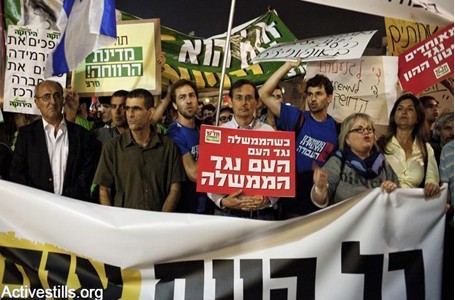
The controversial and anti-democratic governability bill that attempts to make it harder to topple government will proceed to the Knesset for its first reading after being approved by a 7-6 vote in the Knesset Constitution, Law and Justice Committee on Monday.
Consequently, the part of the original bill raising the electoral threshold for Knesset parties to four percent of the vote in Knesset elections will not be brought to the Knesset at present. This part of the proposed law was expected to force the Arab parties in the Knesset to unite in order to pass the threshold in future elections. Other parts of the approved bill would enable the Knesset to hold a no-confidence vote in the government once a month if the motion is supported by at least 61 MKs and allow the government to continue functioning even if the Knesset does not approve the state budget.

MK Khenin (with a red banner) during a rally for democracy in Tel-Aviv, May 2012 (Photo: Activestills)
The committee debate over the proposed law stretched out over six hours. After a controversial vote annulled by the Knesset’s legal counsel, Knesset Constitution, Law and Justice Committee chairman MK David Rotem held another committee vote that paved the way for the bill to make its way to the Knesset for its first reading. During the stormy committee session, Yisrael Beiteinu leader Avigdor Lieberman quietly conferred with the bill’s co-sponsor, Yesh Atid MK Ronen Hoffman in an attempt to conclude discussions and bring the bill to a Knesset vote before its summer recess.
Members of the opposition accused Yisrael Beiteinu’s Rotem, who was also a bill co-sponsor, of an underhanded political maneuver made at the behest of party leader Avigdor Lieberman. Previous understandings between the government coalition and opposition parties had determined that the law would not move forward before the end of the Knesset’s summer session this August. The main dispute during the debate surrounded the proposed law’s move to raise the electoral threshold to four percent of the vote, which would likely compel the Arab parties to unite ahead of the next Knesset election. “Lieberman is seeking to implement a political transfer of the Arab population outside Israeli politics,” Hadash MK Dov Khenin said during the debate. Khenin stated that there was no problem of governability in Israel, as past prime ministers had gone to war and withdrawn from territories by enlisting the support of their governments and the Knesset without a problem. He added, “The fact that the current prime minister does not know where to proceed is not a problem of governability.”
Meretz part leader MK Zahava Gal-On also questioned the motives behind the bill. “Why make do with raising the electoral threshold to four [percent]? she asked rhetorically. “It would be better to raise the threshold to 50 (percent), so there will be just one party.” She added, “There is no governability problem, there is a government problem. They should be replaced.”
MK Khenin said on Sunday: “Lieberman found a way to drive the Arab MKs out of the Knesset. It is an unprecedented act in which one of the most dramatic changes in the Israeli system of government will be brought to a committee vote in the morning, and without holding a serious debate will be passed for a vote in the full Knesset.” Khenin’s anger, like that of the rest of the members of the opposition, is directed in particular at a central provision of the two bills: Raising the voting threshold for entering the Knesset from 2 percent of all votes cast to 4 percent. This would mean that the smallest parties, and in particular the Arab parties, would be forced to merge before the next election or risk missing the vote threshold. “This law will prevent political representation for a range of minorities in Israel. It says to the Arab parties: ‘Either you unite, since after all you are all Arabs, or you will not be represented anymore in the Knesset,'” Khenin said.


